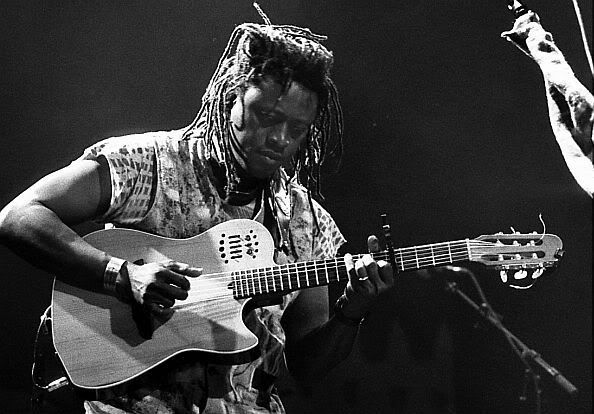 ...I remember one of the thoughts that crossed my mind when I first learned I was being offered a Peace Corps assignment in Mali. For some reason, I already knew that Mali was known for a rich and vibrant musical tradition. Maybe it was my musician friends whose first reaction to my "I'm going to Mali" announcement was something to the effect of "hey, that's where Ali Farka Toure and Salif Keita are from." Hunting around the Barnes and Noble music section, I found a sample collection of Malian music and I recall playing it in my car as I drove around the Twin Cities in my last months of American life. Intricate guitar melodies evocative of the blues, intertwining rhythms, and the polytonal sound of the balafon, a wooden zylophone that instantly made me homesick for the Indonesian music that was the background of my childhood. All this to say, I couldn't wait to get to Mali and to be able to experience this music in its natural setting, in an interactive way.
...I remember one of the thoughts that crossed my mind when I first learned I was being offered a Peace Corps assignment in Mali. For some reason, I already knew that Mali was known for a rich and vibrant musical tradition. Maybe it was my musician friends whose first reaction to my "I'm going to Mali" announcement was something to the effect of "hey, that's where Ali Farka Toure and Salif Keita are from." Hunting around the Barnes and Noble music section, I found a sample collection of Malian music and I recall playing it in my car as I drove around the Twin Cities in my last months of American life. Intricate guitar melodies evocative of the blues, intertwining rhythms, and the polytonal sound of the balafon, a wooden zylophone that instantly made me homesick for the Indonesian music that was the background of my childhood. All this to say, I couldn't wait to get to Mali and to be able to experience this music in its natural setting, in an interactive way.So there I was, in Mali and as chance would have it, living in the capital city, the heart of Malian live music. One of my fellow volunteers was very plugged into the local scene. She kept mentioning this guy named Habib. Habib Koite. I'd never heard his music, but according to her, he's one of the best things Mali has to offer at the moment. Which is saying a lot considering the caliber of artists like Salif and Ali Farka. When word goes round that he'll be doing a concert at the French Cultural Center, a group of us get together and decide to go. The FCC is in itself a bit like stepping back into the western world. The small theatre space has a stage, lighting, theatre seating. It's a bit surreal, but nice. A French woman gets up and says a little piece about Habib and his band, introducing them to us and then the lights go down.
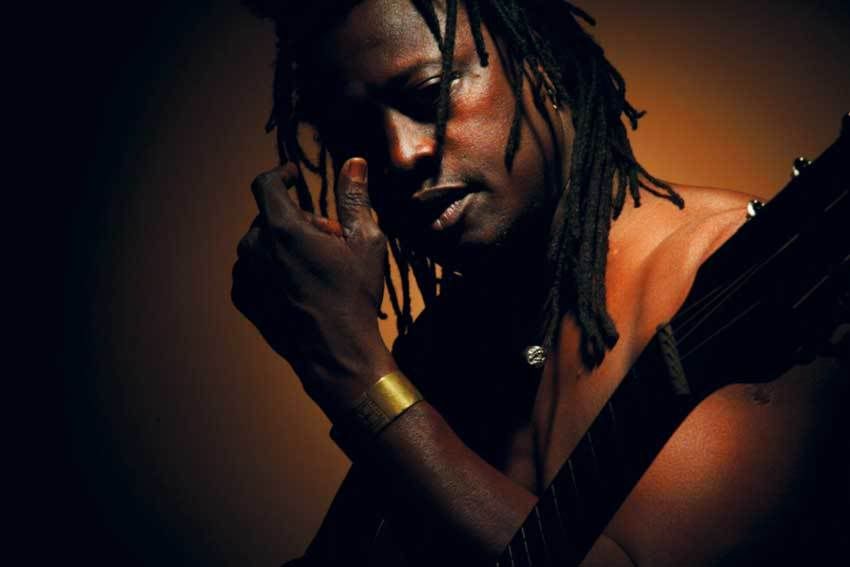 A tall, dredlocked man walks out with a guitar strapped around his neck and takes his place in front of the microphone. He strikes the strings and begins to play a simple, but achingly beautiful melody. As he continues, he embellishes the notes, and the other band members walk out and take their instruments one by one, adding to the sound as it swirls and builds. I am sold before he even opens his mouth and begins singing in a warm tenor voice. I can't explain, but I suppose it is one of the beautiful things about music, the connection it can make with your soul. I feel deep down that this, this moment, this is one of the things I longed to experience in my Malian journey. The concert continues, I turn to my friend from time to time to get whispered explanations about lyrics, all of which are in Bambara. Habib's fingers fly over the strings of his guitar and I'm amazed at how many stylistic influences he embraces. It's obvious that both he and his band have had some experience with all sorts of music. Hints of Latin flamenco guitar, sliding blues notes, flowing classical scales, rock-like riffs. All seamlessly blended together with modern instruments like a drum kit and bass guitar as well as Malian creations such as the talking drum, the balafon, the djembe and the kora. When it's over, I turn to my friend and tell her that I'm a convert. When's the next show?
A tall, dredlocked man walks out with a guitar strapped around his neck and takes his place in front of the microphone. He strikes the strings and begins to play a simple, but achingly beautiful melody. As he continues, he embellishes the notes, and the other band members walk out and take their instruments one by one, adding to the sound as it swirls and builds. I am sold before he even opens his mouth and begins singing in a warm tenor voice. I can't explain, but I suppose it is one of the beautiful things about music, the connection it can make with your soul. I feel deep down that this, this moment, this is one of the things I longed to experience in my Malian journey. The concert continues, I turn to my friend from time to time to get whispered explanations about lyrics, all of which are in Bambara. Habib's fingers fly over the strings of his guitar and I'm amazed at how many stylistic influences he embraces. It's obvious that both he and his band have had some experience with all sorts of music. Hints of Latin flamenco guitar, sliding blues notes, flowing classical scales, rock-like riffs. All seamlessly blended together with modern instruments like a drum kit and bass guitar as well as Malian creations such as the talking drum, the balafon, the djembe and the kora. When it's over, I turn to my friend and tell her that I'm a convert. When's the next show?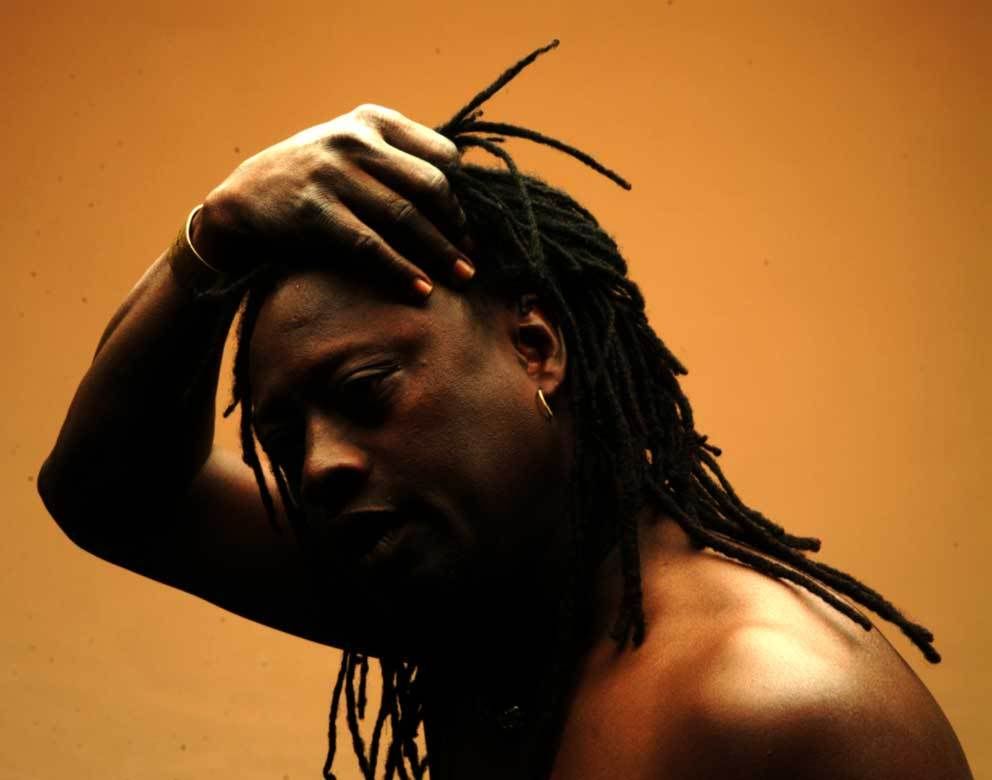
Life in Bamako goes on. Our little group of friends ends up going to see Habib and the band play at the Bouna several times. It turns out to be even more fun there as you can get up and move around, unlike the prim and proper setting of the FCC. Dancing our way through many an evening. Before Mali, I was always too shy about how I would look, how I didn't know any proper steps. But more and more I am letting go of my pride and just allowing the music to move me. I stomp my feet, shake my hips and move around and before I know it, I am having the time of my life. It's freeing and I realize more and more that Africa is helping me learn to live life in the moment. It's the night of Habib's last concert in Mali before he leaves to go on tour in the States. We all joke around with each other that we're going to miss coming out to hear the music. But the show is a good one. The band is on, we are all energized. It goes on until two in the morning. By this time, half of the audience has trickled out, tired and heading to their beds. But we stick around and a few of us walk over to say hi to Habib. He knows my fellow volunteer and asks how we are, how was the show, etc. We make small talk until he is called away on some business matter with his manager. Ah well, guess we should go. But suddenly he is done with whatever it was and he asks us where we're going. Do we want to go out to the Tempo? Er, where's that, we ask. Well, you take a right at the roundpoint, then a right, then a left, then...how many of there are you, he asks. We do a quick head count. Nine or ten, we reply. I can take four in my car, he says, and my friend here can probably take five. Let's go!
We all grin at each other. Ok, we're game. A few of us jump in Habib's car and he puts it in gear, smoothly navigating his way through the deserted streets of downtown Bamako. When we arrive at the club, there's not many people there. A man in his forties, in dredlocks, opens
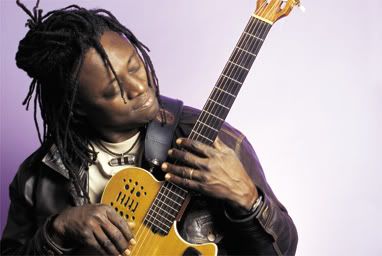 my car door and says hi. He looks vaguely familiar, but I can't place him. We all end up in something of an executive suite hang-out room. Habib conducts furniture moving until we have a very comfortable big circle of low couches and chairs. We all take seats, and I end up across from Habib. The other man comes at sits at the end of the circle. A well-coiffed young woman takes our orders for drinks and small conversations spring up all over the table. Habib introduces the man at the end of the table as "a very great Malian musician, this is Omar..." "Koita!" I finish his sentence. Now I remember him! During my time in training, my host dad in village loved this man's music. We used to listen to his tape over and over. (I think to myself how excited my host dad will be when I tell him that I met his musical idol!!)
my car door and says hi. He looks vaguely familiar, but I can't place him. We all end up in something of an executive suite hang-out room. Habib conducts furniture moving until we have a very comfortable big circle of low couches and chairs. We all take seats, and I end up across from Habib. The other man comes at sits at the end of the circle. A well-coiffed young woman takes our orders for drinks and small conversations spring up all over the table. Habib introduces the man at the end of the table as "a very great Malian musician, this is Omar..." "Koita!" I finish his sentence. Now I remember him! During my time in training, my host dad in village loved this man's music. We used to listen to his tape over and over. (I think to myself how excited my host dad will be when I tell him that I met his musical idol!!)Habib lights up a cigarette, and I tease him with the words to one of his hit songs "no more cigarette. Abana (It's finished/gone)". He grins and replies that he only smokes on very special occasions, and this wonderful evening of meeting new friends and having a good time is one such occasion. The man definitely knows how to be solicitous and charming. In the corner of the room, two very very drunk Malian men, rich government officials or businessmen by their dress, are carrying on loudly. One of them begins calling "Habib! Habib! Chantes, chantes pour nous." (sing for us) At first Habib just glances over at them, smiles, and tells them that he's tired as he just came from giving a concert, but they continue to call at him. I wonder how long it will take for a bouncer to come escort them out, but Habib gets up and goes over to chat with them.
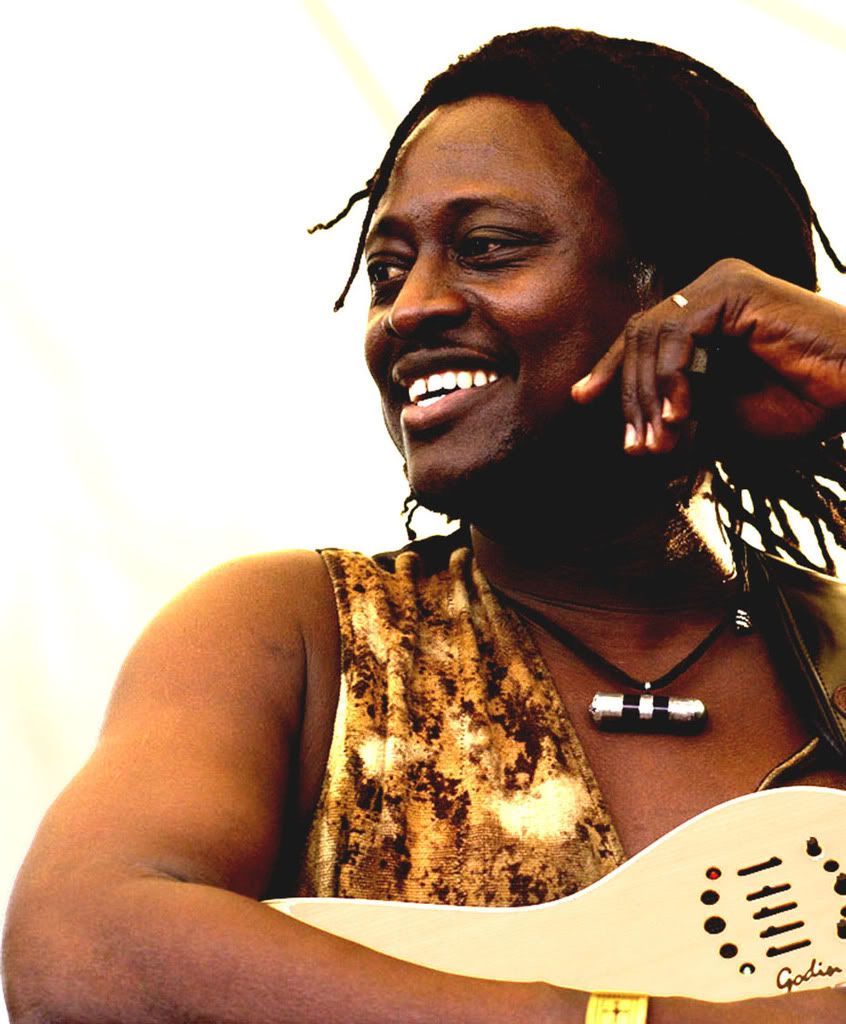 He's courteous and patient, not demeaning. Finally after coming back to sit down with us but still being called upon to sing, he stands up and quiets the room. Then he begins to sing in a clear acapella, presumably making up a song and a tune on the spot. The drunk admirer gazes at him and after the song he begins to cry and sob loudly on the shoulder of his friend, who says loudly in French "see, this is what is so great about Habib. He doesn't forget his roots. He can still do the traditional thing." To which I can only assume he is referring to the griot tradition - the praise singers who are the keepers of the oral traditions. The position is passed down by family and griots are called upon to sing at all major social events in Mali, weddings, funerals, baptisms. Habib's family is griot.
He's courteous and patient, not demeaning. Finally after coming back to sit down with us but still being called upon to sing, he stands up and quiets the room. Then he begins to sing in a clear acapella, presumably making up a song and a tune on the spot. The drunk admirer gazes at him and after the song he begins to cry and sob loudly on the shoulder of his friend, who says loudly in French "see, this is what is so great about Habib. He doesn't forget his roots. He can still do the traditional thing." To which I can only assume he is referring to the griot tradition - the praise singers who are the keepers of the oral traditions. The position is passed down by family and griots are called upon to sing at all major social events in Mali, weddings, funerals, baptisms. Habib's family is griot.In any case, after this minor entertainment the time passes more conventionally. My friend and I engage Habib in a conversation about his thoughts on development and progress. How does he feel about their effects on Malian culture? I specifically make mention to some of the lyrics in a song he wrote about how this generation is a good one. How they have opportunities to see the world through the medium of television. While my French is pretty good now and I can understand everything he says, I sometimes have a hard time following him. He tends to ramble from one subject, one example, one story to another, and I feel that I can't always thread them together. But essentially, he is both hopeful and cautious. Hopeful in that he sees the possibilities of technology but also cautious in that he fears the loss of his culture, a unique and irreplaceable thing. It's a fascinating conversation and I am sad that we've only started it now at this late hour because everyone is winding down and soon we have to leave. It's five in the morning. A new day is coming. As we say our goodbyes, I tell Habib that I hope his tour in the States will be a good one and promise him that I will email all my friends back there to tell them to go to the shows. He says thanks, and we all pile into cars and cabs to go our separate ways. My Malian musical adventures are only beginning.
...and that was indeed just the beginning.



6 comments:
Sula~Beautiful. It's lyrical and you captured the music in your description of the evening. You have a very clear voice, S. I love, love your africa stories and photos.
:)
And look at you, partying with the stars.
Great post, Sula. Love the bit about Africa teaching you to live in the moment.
Wow - I've said before but what an experience you had. And you describe it so well too!! It almost feels like we are in the room with you! I hope you plan on telling us more of your adventures!
*blush* Thank you for stopping by and bothering to read my overly long ramble. hehe.
I didn't sit down and write as much as I should have while I was in Mali, but I do have a few more stories to tell. ;)
Seriously though, I would highly recommend Habib's music to any and everyone. And not just because he's hawt (cuz, let's face it...he is). It's just super quality music that anyone can relate to.
I'm feeling very Africa-homesick right now as I'm looking through photos and trying to put together a presentation about my volunteer experience. It's always amazing to me how places I've lived and visited can stake such a claim on my emotions.
That is a beautiful post, Sula. I'm sorry you are homesick for Africa, and I hope your photos and journals help comfort you. You know, the adage "Home is where you hang your heart," is so very true. You are lucky to be able to claim so many wonderful places as your home.
Cool! just added the juke box with Habib Koité videos and more in my
...blog
Post a Comment